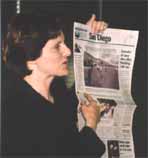Spring 2000
Just Who Are Today’s Citizens?
About 105 journalists were in San Diego Jan. 21-23 for “Straight Talk on Local Issues,” a workshop co-sponsored by the Pew Center and RTNDF. Media scholar and author Michael Schudson gave the keynote address, later condensed in The Philadelphia Inquirer.
By Michael Schudson
Professor, U.C.- San Diego

Everyone wants to reform American citizens. They should vote more. They should know more. They should care more.
Who could disagree? While we’re at it, they should sin less, weigh less, drive less, smoke less and be as responsive to their children as to their e-mail.
We all should be better. But we should first understand today’s citizens before trying to turn them into the paragons we falsely imagine their predecessors to have been. Any plausible improvement in our civic virtues has to begin with a reasonable appraisal of who we are and what we are capable of becoming. To that end, a few elements of realism to keep in mind:
- Americans are not strongly partisan. We inherit a strong anti-party tradition that goes back to George Washington and intensified a century ago when reformers deliberately weakened party structures with the popular primary, non-partisan municipal elections, state-printed ballots, and the initiative and referendum. The party is the mainstay of political mobilization in most democracies, but it is a weak reed in this one and likely will remain so.
- Our political attention span is short and will stay short. In the late nineteenth century when voter turnout was routinely over 70 percent, politics was the best entertainment around, complete with torchlight processions, glee clubs, boys-will-be-boys rowdyism, liquor and cash-for-votes. Those days are long gone. Today politics competes for citizens’ attention with the whole range of mass entertainments. No one will capture it who cannot communicate efficiently – at soundbite length. (Is it possible to do this well? Of course. Try “no taxation without representation” for instance.)
- We are becoming used to new modes of information-gathering and have little nostalgia for older forms. Some of us are permanently addicted to printer’s ink, but educated young people increasingly rely on the Internet for news. Newspapers, beware.
- We have limited political knowledge. Only half of us can name the U.S. senators from our state, only l0 percent can name the Chief Justice of the U.S. Supreme Court. The best studies show that our performance on questions like these has not budged in 50 years. More schooling has not improved the result, nor have more video games, cable, divorce, sex, drugs and rock ‘n’ roll made it worse.
- Political interest varies more than political knowledge. Voter turnout was abysmally low in l996, although higher than it was in l920. Voter turnout in l992 was higher than in l932 or l948. Today John McCain may be drawing a new generation into politics.
- We are less active in certain kinds of voluntary associations than in the 1950s (unions, veterans groups, businessmen’s clubs, the PTA), but we are busy in a wide variety of new groups, and we remain more often joiners, especially of churches, than people of European democracies. Half the population attends church a couple of times a month or more.
- We are not cowed by traditional authority in nearly any form, not by news anchors, experts or politicians. This is the other side of the coin of our limited factual knowledge about politics: we are open to experiment and willing to judge ideas by their practical results rather than their pedigree.
- Our lives are not local but national and global, too. “All politics is local” is one of the day’s great oversimplifications. Mexican and Vietnamese immigrants send money home. People in the streets of Miami get exercised over an international custody battle. A Hmong family in Merced, CA, drives three days straight to Minnesota to find a traditional Hmong healer with a national reputation.
- We have good skills for democracy – a feisty inclination to moral indignation and a disposition to treat others in public in a spirit of equality and informality. Yes, we have an unenviable tradition of racism, too, but that’s by no means the whole story. Foreign observers for 200 years have marveled at our casual and democratic manners.
- Teachers want to be listened to, journalists want to be heeded, politicians want citizens to turn up at their candidate forums. All of them get discouraged by a tepid public response. I know the feeling. But it’s no cause for despair. It’s the rule. The exceptions are rare, but they keep on happening. They’re what we live for.
____________________________________
Reprinted with permission from The Philadelphia Inquirer, April 2000.
* * * * *

Karen Lin Clark told workshop participants how civic mapping produced better stories for the San Diego Union-Tribune.
